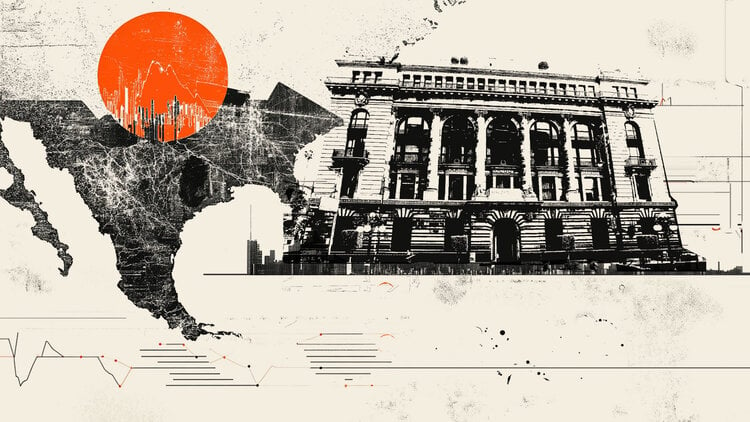- The EUR/GBP pair goes back on Thursday, breaking a three -day recovery to quote about 0.8420 during the American session.
- The weakest eurozone PMI data than expected increase the pressure on the euro.
- The services activity in the United Kingdom shows signs of recovery, while inflation jumps to 3.5% in April, reducing the probability of a short -term BOE rates.
The EUR/GBP crossing on Thursday, going back after a three -day recovery to quote about 0.8420 at the beginning of the American session while investors digest a mixed batch of economic data on both sides. The euro (EUR) is under moderate pressure after the weak data of the purchasing managers (PMI) index of the Eurozone, while the sterling pound (GBP) remains relatively firm after inflation of the United Kingdom (UK) accelerated unexpectedly in April.
The PMI preliminary compound HCob of the Eurozone fell to 49.5 in May from 50.4 in April, failing the market expectations of 50.7. This fall was mainly driven by a more pronounced decrease in the services sector, since the PMI of Services fell to 48.9 from 50.1, below the forecasts of 50.3. In contrast, the manufacturing PMI rose slightly to 49.4 from 49.0, exceeding 49.3 expectations.
The softest figures of the PMI reinforce concerns about a fragile recovery in the eurozone, pressing the euro and strengthening the argument for a rate cut of the European Central Bank (ECB) in June. The markets now see a probability of approximately 90% of a 25 basic points cut at the ECB meeting on June 5, but have discounted only one more reduction for the rest of the year, suggesting that the deposit rate could turn background at 1.75%, according to Reuters.
Adding pressure, the governor of the Central Bank of Belgium, Pierre Wunsch, said that the ECB could eventually need to cut rates at “slightly below” 2% since the current global commercial tensions pose with low risks for both inflation and growth.
Meanwhile, in the United Kingdom, the PMI composed of Global S&P of the United Kingdom rose to 49.4 in May from 48.5 in April, indicating a slight relief in the fall of business activity. The services sector showed a marginal recovery since the PMI of Services rose to 50.2 in April from 49 in March, slightly exceeding market expectations. The manufacturing sector continued to fight with its PMI falling to 45.1 in April from 45.4 in March.
The National Statistics Office (ONS) on Wednesday that annual inflation rose to 3.5% in April, from 2.6% in March and well above the expectations of the market of 3.3%.
The expansion in the services sector, combined with higher inflation than expected, could give to the Bank of England (BOE) reasons to refrain from cutting interest rates in your next meeting. At the same time, contraction in the manufacturing sector highlights the underlying weakness in the United Kingdom economy, which means that the BOE is unlikely to act aggressively in any direction and could maintain the interest rate without changes in the short term.
FAQS Central Banks
Central banks have a key mandate that consists in guaranteeing the stability of prices in a country or region. Economies constantly face inflation or deflation when the prices of certain goods and services fluctuate. A constant rise in the prices of the same goods means inflation, a constant decrease in the prices of the same goods means deflation. It is the Central Bank’s task to keep the demand online by adjusting its interest rate. For larger central banks, such as the US Federal Reserve (FED), the European Central Bank (ECB) or the Bank of England (BOE), the mandate is to maintain inflation about 2%.
A central bank has an important tool to raise or lower inflation: modify its reference interest rate. In precommunicated moments, the Central Bank will issue a statement with its reference interest rate and give additional reasons of why it maintains or modifies it (cut it or the SUBE). Local banks will adjust their savings and loan rates accordingly, which in turn will make it difficult or facilitate that citizens obtain profits from their savings or that companies ask for loans and invest in their businesses. When the Central Bank substantially rises interest rates, there is talk of monetary hardening. When it reduces its reference rate, it is called monetary relaxation.
A central bank is usually politically independent. The members of the Central Bank Policy Council go through a series of panels and hearings before being appointed for a position in the Policy Council. Each member of that council usually has a certain conviction on how the Central Bank should control inflation and the consequent monetary policy. Members who want a very flexible monetary policy, with low types and cheap loans, to substantially boost the economy, while comprising with inflation slightly greater than 2%, are called “pigeons.” Members who prefer higher types to reward savings and want to control inflation at all times are called “hawks” and will not rest until inflation is located at 2% or just below.
Normally, there is a president who directs each meeting, has to create a consensus between the hawks or the pigeons and has the last word when the votes must be divided to avoid a draw to 50 on whether the current policy must be adjusted. The president will pronounce speeches, which can often be followed live, in which he will communicate the current monetary position and perspectives. A central bank will try to boost its monetary policy without causing violent oscillations of the fees, the actions or their currency. All members of the Central Bank will channel their position towards the markets before a monetary policy meeting. A few days before a monetary policy meeting is held and until the new policy has been communicated, the members are prohibited from speaking publicly. It is what is called a period of silence.
Source: Fx Street
I am Joshua Winder, a senior-level journalist and editor at World Stock Market. I specialize in covering news related to the stock market and economic trends. With more than 8 years of experience in this field, I have become an expert in financial reporting.







